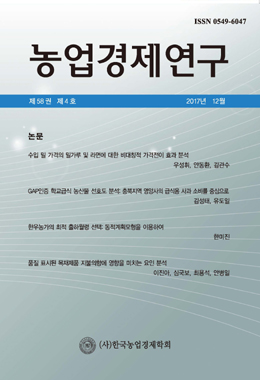This study aims to investigate whether it would be possible to expand the supply of GAP certificate products through school meal programs. The conjoint analysis method is applied to the case of apple consumed in school meal programs by taking questionnaire to school dietitians in Chungbuk province of Korea. The following 4 factors are considered as attributes of products: pesticide and fertilizer (PF) management representing environment-friendly certification, critical control point (CCP) management representing GAP certification, GMO, and the price. Results show that the importance of attribute is evaluated to be the highest in the order of price, PF, GMO, and CCP, showing GAP certificate products are less used for school meal programs than environment-friendly products are. Dietitians with higher reliability for GAP certificate products are shown to put more emphasis on CCP than those with lower reliability. Results of k-means cluster analysis suggest CCP is considered most for dietitians pursuing middle-level price.


